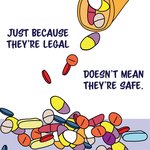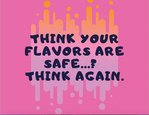

With the COVID-19 pandemic having kept many people mostly indoors these past few months, local leaders who work with youths have concerns about how that unstructured time and boredom has affected teens — particularly in terms of drug use.
Nationwide, suspected drug overdoses rose 18% in March, 29% in April and 42% in May when compared to numbers from 2019, according to data from the Overdose Detection Mapping Application Program. ODMAP is a program started by the Washington/Baltimore High Intensity Drug Trafficking Area in 2017 to track overdoses and set alerts across many different users.
George Greger-Holt is the community outreach coordinator for Chatham Drug Free, a county-wide coalition to help prevent alcohol, tobacco and drug use among youth. He’s worried about how the increased amount of unsupervised time from the pandemic has affected Chatham youth.
“Unsupervised time and boredom creates all kinds of pitfalls for young people,” he said. “We were worried that not only would drug use be up, but also small time crime or, you know, delinquency petitions. I would expect to see all that stuff increase and maybe even teenage pregnancy.”
At its July 9 virtual meeting, Chatham Drug Free discussed several long-term initatives the coalition is investing in. Among these projects is a social media campaign targeted at youth ages 12 to 20 through Instagram, Facebook, Snapchat, and eventually TikTok as well. There are two campaigns — one to reduce opiod use and overdose, and another to educate about the dangers of vaping and nicotine. The two campaigns are funded through a State Opioid Response grant and a Healthy Communities grant, Greger-Holt said.
“We know from research, both here in Chatham and across the nation, that if we can raise perceived harmfulness, that is the belief that the negative consequences of drug use will happen to the user, then we can reduce that person’s probability of using the drug,” he said. “Both campaigns started right before the coronavirus lockdown and were originally intended to also have a school-based component. As we all know, school closed so we were not able to initiate that part of the campaign, although our hope is that we can continue as soon as students are back in the buildings.”
Lt. Sara Pack, public information officer for the Chatham County Sheriff’s Office, told the News + Record in an email last week that the sheriff’s office “cannot confirm any rumors of an uptick in drug usage over the course of the pandemic.”
“At this time, we do not have evidence to support that theory,” she said in the email.
However, the she said the sheriff’s office does recognize the toll the pandemic is taking on many people.
“Drug abuse doesn’t solve problems — instead, it compounds suffering both for the individual and community,” Pack wrote. “Our staff hopes those considering turning to drugs due to feelings of hopelessness, depression, or even boredom remember that there are positive, constructive alternatives at their disposal, and that the Sheriff’s Office cares about their safety and wellbeing.”
At Chatham Drug Free’s meeting on July 9, the group also discussed the Sheriff’s Prevention Partnership Action Plan Tracker and Materials Distribution documents. These tools provides a way for members of the Sheriff’s Prevention Partnership on Controlled Substances (SPPCS) to document activities related to the work done by subcommittees concerning prevention, harm reduction, access to treatment and recovery.
The SPPCS was formed by Chatham County Sheriff Mike Roberson and retired Chatham County Health Director Layton Long. In 2017, the group formed and implemented an action plan to address the impact of the national opioid crisis at the local level with the intention of saving lives.
“The SPPCS has provided public meetings in local communities to raise awareness, answer questions, and share resources with those who need them most,” Lt. Pack said.
Greger-Holt said the coronavirus has hampered the coalition’s efforts to initiate many planned porgams — due to canceled events and being unable to meet as a group in-person.
“Much of our work in prevention is done with the community during community events, which for the time being have either been postponed or canceled,” he said. “Our efforts haven’t stopped, but have been severely curtailed by our inability to meet face-to-face with each other or pop in to each other’s offices with questions or ideas.”